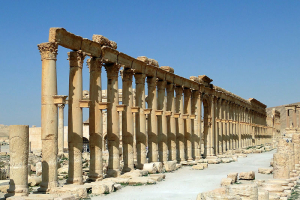Experts have warned that the Islamic State's swift overtaking of the city of Palmyra, Syria marks the "the fall of a civilization", as the militant group is known for its brutal destruction of historic artifacts and structures.
"Human, civilized society has lost the battle against barbarism. I have lost all hope," Syria's antiquities chief Maamoun Abdulkarim told Reuters on Thursday.
A short time earlier, he told the news source, "If IS enters Palmyra, it will spell its destruction," and if the ancient city falls, "it will be an international catastrophe...It will be a repetition of the barbarism and savagery which we saw in Nimrud, Hatra and Mosul," he added.
Islamic State forces entered the ruins after taking complete control over the area on Thursday, forcing Syrian government forces to retreat. The group, which is bent on expanding its brutal caliphate, now controls more than half of Syrian territory, including the central city's military air base, prison and intelligence headquarters.
The city's capture threatens a UNESCO World Heritage Site described as having "stood at the crossroads of several civilizations," with its art and architecture mixing Greek, Roman and Persian influences dating back to the 1rst century, according to a U.N. group.
The BBC notes that while hundreds of statues have been moved from the ancient city to other safe locations, Palmyra's museum, along with large immovable monuments, remain in the area.
Syrian officials have expressed fears that ISIS soon plans to destroy the ruins and the region's cultural history, as a tweet from Syrian Activists claimed that bulldozers were already on their way to the site.
Irina Bokova, Director-General of UNESCO, said that she was "deeply concerned" by the situation. "The fighting is putting at risk one of the most significant sites in the Middle East, and its civilian population," she said. "I reiterate my appeal for an immediate cessation of hostilities at the site. I further call on the international community to do everything in its power to protect the affected civilian population and safeguard the unique cultural heritage of Palmyra."
British historian and novelist Tom Holland noted that the destruction of Palmyra would be a "severe loss" and "tragedy"for the entire world.
"Mesopotamia, Iraq, Syria, this is the wellspring of global civilization," he told CNN. "It really couldn't be higher stakes in terms of conservation."
Fears that the militant group will destroy the ancient city are not unfounded. In March, the group bulldozed the ancient Assyrian city of Nimrud in northern Iraq and looted priceless items dating back 13 centuries B.C., including statues and other historic objects.
A short time earlier, the group released a video showing them destroying Assyrian era statues and sculptures in Mosul, formerly home to thousands of Christians. In addition to leveling a fourth-century Syrian monastery, the group is faulted with destroying a tomb believed to be that of biblical prophet Jonah.
While the jihadist group has justified the destruction by claiming the religious statues, manuscripts and relics are "idolatrous," experts believe the militants traffic the items to fund their military and destroy only those pieces that are too large to be smuggled.
"They have networks that allow them to traffic in cultural treasures," said Fawaz Gerges, professor of Middle East studies at The London School of Economics. "They have made tens of millions of dollars selling artworks."

















